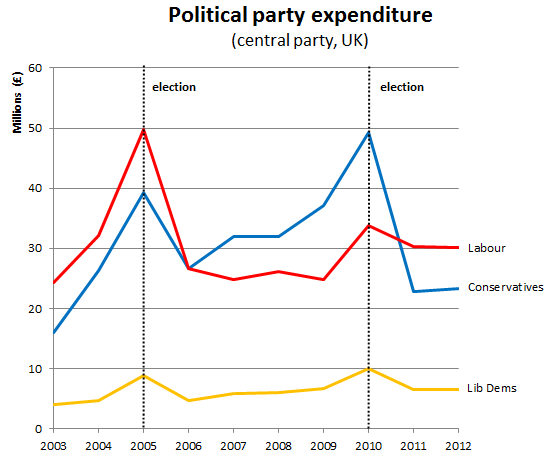Party funding
- The Conservatives, Labour and the Lib Dems agree that there's a need to reform party funding, but they stand divided on what it entails.
- The options for reform include imposing a cap on individual donations and increasing the taxpayer's subsidy.
- It's not yet clear whether any proposed cap would apply to trade union contributions - the Labour party's main source of funding.
How party funding and spending compares
Since 2011, the Labour party has recorded the highest income of the three main political parties. In 2012, it collected £33 million, more than the Conservatives (£24.2 million) and Lib Dems combined (£6 million).
The Electoral Commission also requires the political parties to submit accounts of their expenditure. When in opposition, a party often spends more on its campaigns. Between 2006 and 2010 the Conservatives outspent Labour; now, with a Coalition government, Labour are writing bigger cheques.

Rich patrons and union paymasters: what are the options for reform?
In their 2010 manifestos, Labour, the Conservatives and the Lib Dems all committed to reform party funding.
A 2011 report from the Committee on Standards in Public Life warned that the current arrangement - whereby party leaders were obliged "to spend time soliciting those individuals or organisations for the funds they need to survive" - was open to corruption. However, Sir Christopher Kelly, the chair of the Committee, made clear that there was "no hard evidence" of current corruption.
In February 2012 the Deputy Prime Minister invited the three main parties to take part in cross-party talks, but negotiations have now stalled.
- Limiting donations
After the 'cash for peerages' scandal and then the 'dinners for donors' controversy, there has been broad agreement on the need for a cap on individual donations. In both cases, wealthy donors appear to have been granted special privileges after pledging substantial sums to the party in government.
At present, there's no limit on donations. However, any individual (or organisation) intending "to spend significant amounts" at a general election is required to register as a 'third party' with the Electoral Commission. A "significant amount" is defined as over £10,000 in England, and £5,000 or more in Scotland, Wales and Northern Ireland.
In its 2011 report the Committee for Standards in Public Life proposed a £10,000 cap. The Labour party has recently suggested a limit of £5,000.
- Taxpayer subsidy
Any cap on private donations is likely to involve the parties facing a considerable shortfall in their funds.
David Cameron said that Ed Miliband's £5,000 cap wouldn't be sustainable because it would probably involve "a massive amount of taxpayer support". Many politicians believe that the electorate wouldn't tolerate this option, with household budgets already under pressure.
- Trade union funding
The Coalition and the Labour party are currently wrangling over whether trade union contributions would count as individual donations and be subject to the same cap.
As it stands, trade union members must opt-out of funding the Labour party. In July Ed Miliband outlined plans to reverse this arrangement. If union members are invited to opt in, this will end automatic donations to the party.
In May 2013 a cross-party group of MPs published a draft bill proposing a donations cap that applied to all donors - including trade unions.
According to the draft bill, optional affiliation fees would be treated as "bundled" individual donations, provided trade unions meet certain conditions. In other words, as long as people have made a positive choice to donate money to a party, there's no reason why a trade union can't collect these fees and donate a lump sum.
Further reading
Party funding: background and developments since November 2011 - Commons Library Standard Note
Funding Democracy: Breaking the Deadlock - a draft bill for consultation